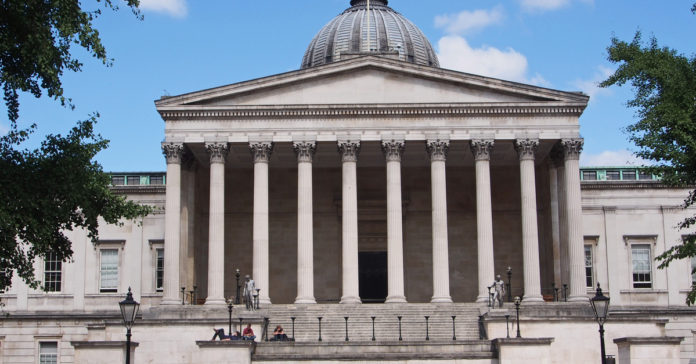University College London is to reconsider how it defines antisemitism after an internal academic board rejected the use of the International Holocaust Remembrance Alliance’s definition, which has been pushed hard by the pro-Israel lobby.
The vote by UCL’s academic board calls on the university to “retract and replace IHRA working definition with a more precise definition of antisemitism.”
It follows a report by a working group of UCL academics that warned the IHRA definition conflates anti-Jewish prejudice with political debate over Israel and Palestine, which could have “potentially deleterious effects on free speech, such as instigating a culture of fear or self-silencing on teaching or research or classroom discussion of contentious topics.”
Noting that more than 40 members of the academic board had opposed the IHRA definition when it became UCL policy in 2019, the report concluded: “This specific working definition is not fit for purpose within a university setting and has no legal basis for enforcement.”
The academic board’s vote was supported by the UCL branch of the University and College Union, which has a national policy of opposing a “politicised and divisive definition.”
Education Secretary Gavin Williamson last year threatened sanctions against universities that failed to adopt the IHRA definition.
Following the decision, Ben Jamal, Director of Palestine Solidarity Campaign, said: “This study, the most systematic yet undertaken by a group of eminent academics, reinforces the concerns that have been expressed by a wide range of bodies since the UK government adopted the IHRA definition in 2016.
Subscribe to our newsletter and stay updated on the latest news and updates from around the Muslim world!
“The definition has been used to prevent both discussion of the facts of Israel’s oppression of the Palestinian people and calls for action to address that oppression. It thereby undermines freedom of expression at Universities and more widely. Gavin Williamson needs to stop pressuring universities to adopt. Moreover, all public bodies considering adoption need to address seriously the findings of this report.”
Sir Geoffrey Bindman QC added: “Concerns about the coercive attempts to force public bodies to adopt the IHRA definition are clearly shared by lawyers and academics alike. The Government must cease its pressure on institutions to curtail debate and restrict freedom of expression.”
However, UCL Jewish Society and the Union of Jewish Societies said in a statement: “[We are] disturbed by the decision of the UCL academic board to support the recommendation to replace the IHRA definition. Jewish student voices will not be silenced, nor dictated to by a small group of academics, who are more interested in theoretical discussion of antisemitism than practically supporting their students. We are confident that the Provost, Dr Michael Spence, will make the correct decision and reject the recommendation of the academic board.”
A UCL spokesperson said: “The decision to adopt the IHRA was passed by an overwhelming majority of UCL’s council – the university’s governing body – as part of its commitment to drive race equality and tackle discrimination along with other action to raise awareness and understanding of different forms of racism. By adopting the IHRA, UCL has sent a strong message that we take antisemitism seriously and are committed to tackling it.
“A meeting of UCL’s academic board voted to make an advisory recommendation to council to find an alternative definition to the IHRA. Council will now consider this recommendation and will continue to consult and listen to the views of the entire UCL community.”


















